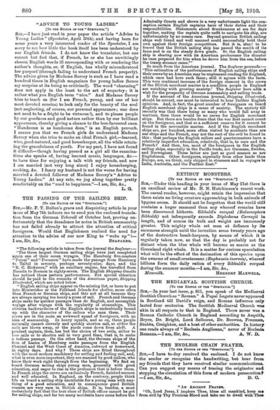THE PASSING OF THE SAILING SHIP.
(To TEl EDITOR OP THE " SrEcTAToa."1 Six,—Mr. F. T. Bullen's grave and disquieting article in your issue of May 7th induces me to send you the enclosed transla- tion from the German Ueberall of October last, proving un- fortunately that the decadence he notes in British seamanship has not failed already to attract the attention of critical foreigners. Would that Englishmen realised the need for attention to the advice of our new Xing to "wake up "The following article is taken from the journal the Seafarer :- `The The three largest German sailing ships have just completed again one of their ocean voyages. The Hamburg five-masters "Potosi" and "Preussen" have made the passage from Hamburg to Taltal in seventy, perhaps seventy-nine, days, and the "R. C. Rickmors," with an auxiliary engine, has travelled from Bassein to Bremen in eighty-seven. The English Shipping Gazette has noticed these pattern performances. But special attention should be paid to the remarks of the American paper, Shipping Illustrated, which are noted below.
" English sailing ships appear on the missing list, or have to put into Montevideo or the Falkland Islands for shelter, more often than French or German ships, and this not at all because they are always carrying too heavy a press of sail. French and German ships make far quicker passages than do English, and accomplish voyage after voyage with the regularity of steamships. This obvious backwardness of the English ships is undoubtedly bound up with the character of the sailors who man them. Their crews are in the main an awkward squad of foreigners, with no idea of seamanship. In heavy squalls, and so on, these people naturally cannot cleverly and quickly shorten sail, so either the sails are blown away, or the yards come down from aloft. A prudent captain, then, has but the choice of two evils, either to lose sails or to shorten sail in very good time, that is, to make a tedious passage. On the other hand, the German ships of the firm of Laeisz of Hamburg make passages from the English Channel and the West Coast of America, outward or homeward, in eighty days. And why ? These ships are fitted throughout with the most modern machinery for setting and furling sail, and, -what is even more important, they are manned by good sailors, who know their work right through from the beginning. We find on board German sailing ships young men, generally with good education, and eager to rise in the profession that is before them. In French ships the crews are exclusively French, finished seamen and well educated. In England, on the contrary, people think life on board a sailing ship unsuitable for a young man with any- thing of a good education, and in consequence good British seamen are very rare in British ships. It is, besides, a most melancholy fact that the best class of British officer cannot be got for sailing ships, and far too many accidents have come before the Admiralty Courts and shown in a very unfortunate light the con- ception certain English captains have of their duties and their responsibilities. Statements about drunkenness at sea for days together, making the captain quite unfit to navigate his ship, are unfortunately by no means rare. Beyond question British sailing ships well found and well manned could successfully hold their own against their foreign competitors. But it is, alas ! to be feared that the British sailing ship has passed the zenith of its fame and is on the steady down grade. So the English sailing ship is sharing now with its American predecessor the disaster he once prepared for him when he drove him from the sea, before the tramp steamer came." So much from the American journal. The S eafarerproceeds 'This estimation of the performances of English sailing ships and their crews by an American may be unpleasant reading for England, which once had here such fame ; still it agrees with the facts. This very continual increase of the foreign element in the crews of the British merchant marine is a condition people in England are watching with growing anxiety.' The Seafarer here adds a wish for the prosperity of German seamanship and sailing trade. If the account of the American journal, Shipping Illustrated, should be correct, one must be interested to hear further English opinions. And, in fact, the great number of foreigners on board English merchant ships is a cause of anxiety. The anxiety till recently was that there being so many who would fall away in wartime, then there would be no crews for English merchant ships. But there are besides fears that the war fleet cannot count on the foreigners, and that so a sufficient reserve for it cannot be found in the mercantile marine. And if the English merchant ships are, per hundred, more often visited by accidents than are our ships and the French, may not the root of the evil be found in this : that perhaps the English sailors and quartermasters have a relatively imperfect education, relatively, that is, to ours and the French ? And then, too, most of the foreigners in the English sailing ships, especially in the Pacific trade, are Germans, Swedes, and Norwegians. These latter are just as good seamen as are Englishmen. Other foreigners, especially from other lands than Europe, are, we think, only shipped in steamers and in voyages to India, Australia, and the Further East."














































 Previous page
Previous page